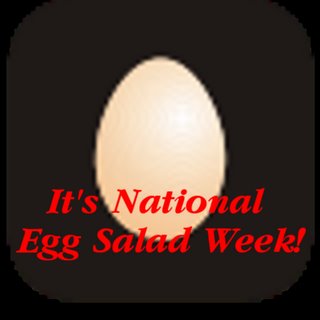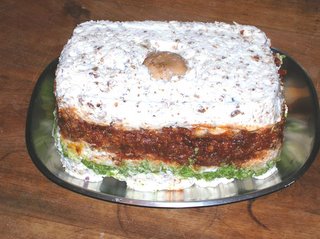How piercful grows
The hazy yon
How myrtle turtle thou
For Spring hath sprung
The cyclotron
How high browse thou
Brown cow?
-- Walt Kelly
What better symbol for a new (year, season, beginning) then an egg? Fecund Spring demands it. Nu, it's an aphrodisiac. Or, as a nurse once informed me: "It's a cheap source of protein."
Of late this wonder food that provides so much has been veiled with suspicion. Bureaucrats warn us of nasty bacteria. Manufacturers offer us substitutes that are "just as good only better" without half the stuff.
With a death rate of no more than five people per year, you take a greater risk driving to the store to purchase those eggs.
The culprit in the
egg affair is carelessness. Eggs are one of nature's most nearly perfect designs. Delicate yet sturdy. Moisture tight. Able to store its contents for a good long time provided:
- The shell remains intact
- It is not heated above shade temperature
- It is not exposed to strong sun
Eggs a merchant set in the window, or next to a motor, grew salmonella. That is nasty stuff. But a little attention prevents its ingestion. It smells. It looks weird. A bad egg is obvious. Literally, if not always figuratively.
This time of year Del observed that soon the fish boats will head to Alaska for the summer fishery. Every one of them will have a crate of eggs stowed on deck under a ladder not too far from the galley. The ladder will shade the crate and the air will keep it cool enough to feed the crew all summer long.
My eggs live on top of the refrigerator, which is out of the sun. I have done this for over a decade and encountered one egg that was bad, no question about it. There were two others I threw away through being a nervous nelly, because I couldn't remember if I put that crack there just now, or I had missed seeing it at the store. The reward for this practice is how the eggs work in baked goods: light, high, delicate, because the mixing begins with room temperature eggs. (Legal counsel advises I remind you to read the caveats in the upper right hand corner.)
This holiday season presents the cook with the challenge of getting the eggs boiled correctly. Directions by noted authorities disagree. Some times violently. Some old world cultures simmer the eggs for hours and hours and flourish forth a perfectly cooked egg. I suspect this is possible only if your Gran trained you. New tech types attack the problem with thermometers, hygrometers, micrometers and chronometers. With a blast of the Ipod Voluntary (by Corelli) the result rolls out.
Either way its a crap shoot.
First of all, oh best beloveds, one does not boil an egg. We have no interest in boiled eggs. They are tough and rubbery with a slime green hue around the yolks. Instead we
cook eggs. Here's how.
Place the eggs in a single layer in a heavy saucepan and cover with cold water by at least one inch. Add a teaspoon of salt. (If the shell cracks, this helps coagulate the escaping white more quickly.) Leaving the pot uncovered, turn the heat to high. As soon as the water comes to a boil, turn off the heat and cover. After 10 minutes, remove the cover and run cold water over the eggs for one minute. (For firmer yolks, leave the eggs to cool in the water for up to two hours.) Refrigerate up to one week.
To peel, gently tap each egg against the counter, turning to make a crackle pattern. Start peeling at the broad end, where there is an air pocket. For the best flavor, eggs, once peeled, should be used within a few hours.
As we approach the egg-laying-bun-rab season there are several strategies available to the dye averse.
- Cook with natural colorants: onion skins, beets, and so forth
- Crackle your egg shells and steep in tea.
- Pickle them
I prefer the later and use my variant of a recipe a friend's Gran Brought From Russia.
tm
Square Egg Maker
Cook the eggs as above. (Then I turn them into cubets. See pix) Mix, in a sauce pan, a pint of white vinegar, a half pint of water, three to six tablespoons of brown sugar, a tablespoon of pickling spices and whatever other whole spice you think tasty, as: star anise, cinnamon, clove-, mustard, or crushed red pepper. Add a sliced sweet onion and two or three beets, sliced or julienned. Heat to boiling and simmer until the vegetables are
al dente. Add a dozen shelled eggs and simmer another three minutes. Put in a jar and cool. Wait a week.
I never make it a full twelve hours.
Fortunately, as you eat the good stuff, you can add new good stuff to the pickle juice and the next day its pickles!
Del once had property in Grand Forks, British Columbia. His neighbors included several
Dukhabors. Del recalls sitting at their kitchen tables with large bowls full of dozens of exquisitely patterned and colored eggs at their centers. The men sitting at the tables would casually reach into the bowls and -- whack! -- smash those beautiful things to pieces with no more notice then I might use to break a cracker in two.
But the best part comes after the holiday. Per Jurgen Gothe of Disc Drive:






